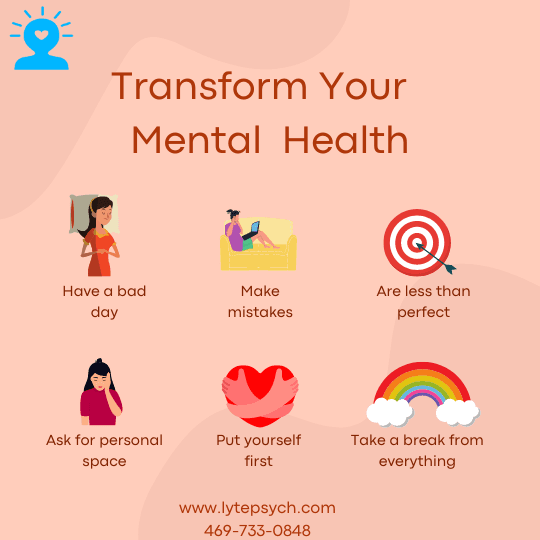Fri Mar 08 2024
5 Things to Do Daily to Transform Your Mental Health a Guide from Lyte Psychiatry (Your Psychiatrist Near You) Located in Dallas Fort Worth, TX.

Transform Your Mental Health Every Day at Lyte Psychiatry (Your Psychiatrist Near You) Dallas, TX.
Maintaining mental health becomes a pivotal aspect. of living a balanced life. From dealing with anxiety, depression, PTSD, and ADHD, to managing the complexities of medication management, the journey towards mental well-being is both personal and universal. Let's explore daily actions and strategies to empower your mind and transform your mental health, with insights on how Lyte Psychiatry can support you on this journey.
Understanding the Foundation of Mental Health
The Power of Positive Thinking
The mind is a powerful entity. Cultivating a positive mindset can significantly alter your perception, influencing your mental health. Research suggests that optimism may contribute to better stress management and improved health outcomes.
The Role of Mindfulness and Meditation
Mindfulness and meditation are not just buzzwords; they are practices that have been linked to reduced symptoms of anxiety and depression. Incorporating mindfulness into your daily routine can help you stay present and reduce stress. (Mindful)
Daily Strategies to Strength Your Mental Health
1. Exercise Regularly: Physical activity is a great way to reduce symptoms of depression and anxiety. Even a short walk can release endorphins, improving your mood and decreasing stress levels.
2. Eat a Balanced Diet: Nutrition plays a crucial role in mental health. Foods rich in omega-3 fatty acids, antioxidants, and vitamins can support brain health and improve mood.
3. Sleep Well: Quality sleep is essential for mental health. Establishing a regular sleep schedule can help regulate mood and reduce anxiety.
4. Connect with Others: Building strong, healthy relationships can provide emotional support and decrease feelings of isolation.
5. Practice Gratitude: Taking time to acknowledge the things you're grateful for can improve your mental outlook and decrease symptoms of depression.
Incorporating Professional Help
While daily actions are vital for maintaining mental health, professional help plays a crucial role in managing more severe conditions like PTSD, ADHD, anxiety, and depression. Lyte Psychiatry offers comprehensive services, including medication management, tailored to your unique needs. Learn more about how Lyte Psychiatry can support your journey towards mental well-being at Lyte Psychiatry.
Overcoming Barriers to Mental Health
1. Recognizing the Need for Help
Acknowledging that you need support is the first step towards recovery. Don't let stigma deter you from seeking the help you deserve.
2. Finding the Right Support
Choosing the right therapist or psychiatrist is crucial. Look for professionals who specialize in treating your specific condition and with whom you feel comfortable.
3. Staying Committed: Mental health recovery is a journey. Stay committed to your treatment plan and daily practices for the best outcomes.
Empowering Your Mental Health with Lyte Psychiatry
If you're struggling with mental health issues like anxiety, depression, PTSD, or ADHD, Lyte Psychiatry is here to help. With a focus on personalized care and comprehensive treatment options, including medication management, we're dedicated to supporting you on your path to mental wellness.
To schedule an appointment with us. Click Here
To see our services. Click Here
Feel free to call us if you have any question at 469-733-0848
FAQs
Q: How can mindfulness and meditation help with anxiety?
A: Mindfulness and meditation can reduce stress and anxiety by helping you stay present and focused, reducing rumination and worry.
Q: What are the benefits of exercise for mental health?
A: Regular exercise can help decrease symptoms of depression and anxiety, improve mood, and boost overall well-being.
Q: How does a balanced diet impact mental health?
A: Eating a diet rich in fruits, vegetables, lean protein, and whole grains can support brain function and reduce symptoms of depression and anxiety.
Q: Why is sleep important for mental health?
A: Quality sleep helps to regulate mood, improve brain function, and decrease the risk of mental health disorders.
Q: How can Lyte Psychiatry help with medication management?
A: Lyte Psychiatry offers personalized medication management plans to effectively treat conditions like anxiety, depression, PTSD, and ADHD, ensuring the best outcomes for your mental health.